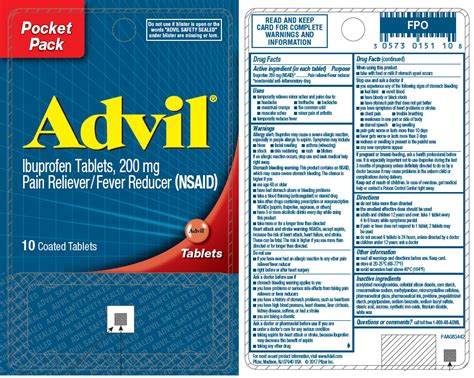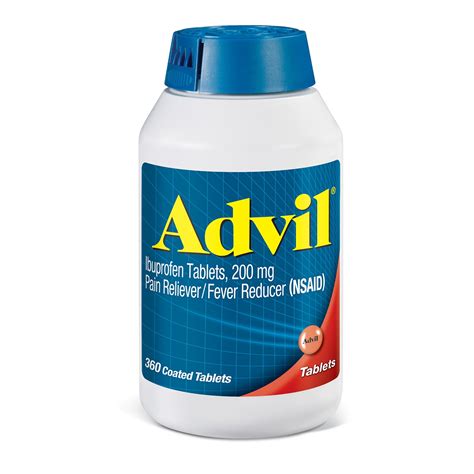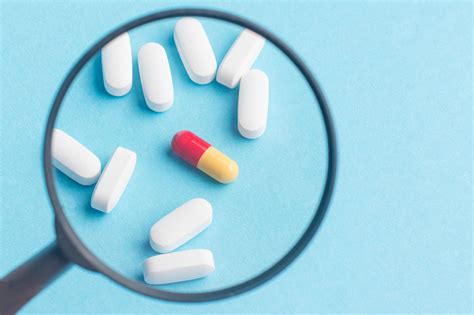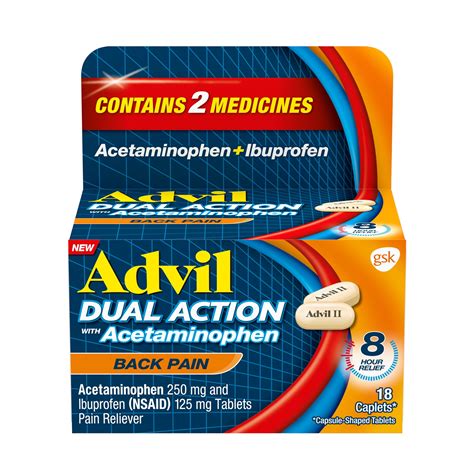How to Spot Fake Advil: A Comprehensive Guide to Identifying Counterfeit Pain Relievers
Advil, a popular over-the-counter pain reliever, is a trusted brand by millions. However, with the rise of counterfeit products, it’s crucial to be vigilant and learn how to identify fake Advil. Counterfeit medications can pose serious health risks, as they may contain harmful ingredients or be ineffective. This comprehensive guide will equip you with the knowledge and tools to distinguish genuine Advil from counterfeit products.
Counterfeit Advil can be difficult to spot as they are often made to look almost identical to the real product. However, there are certain indicators that can help you distinguish between the real thing and a fake. This article will cover the common signs of counterfeit Advil and how to protect yourself from purchasing a fake product.
What are some of the most common indicators that Advil pain relievers are counterfeit?
Counterfeit Advil often displays certain telltale signs that can help you identify them. Some common indicators include:
- Different packaging: Counterfeit Advil may have packaging that looks slightly different from the genuine product. The color, font, or layout might be off, or the packaging may feel flimsy or low-quality. Look for any inconsistencies in the printing, misspellings, or unusual graphics. The packaging of counterfeit medication may be off-center or have uneven edges.
- Suspicious labeling: Counterfeit Advil may have labels with misspellings, incorrect information, or missing information, such as the expiration date, batch number, or manufacturer’s details. The label might be blurry, faded, or have uneven ink distribution. The size and spacing of the text may also differ from the genuine product.
- Unusual pills: Counterfeit Advil pills may have a different shape, size, color, or texture compared to genuine pills. They might have inconsistencies in their appearance, such as uneven edges, discolored spots, or an unusual odor.
- Low price: Counterfeit Advil is often sold at significantly lower prices than genuine Advil. Be cautious of deals that seem too good to be true, particularly when purchasing online or from unauthorized vendors.
- Unfamiliar source: If you are purchasing Advil from an unfamiliar source, such as an online marketplace or a street vendor, there is a higher risk of getting counterfeit products. Always buy Advil from reputable pharmacies and retailers.
Understanding these common indicators can help you stay informed and avoid purchasing counterfeit Advil. Always inspect the packaging, labeling, and pills carefully before purchasing. If you have any doubts about the authenticity of a product, it’s best to err on the side of caution and avoid purchasing it.

How can I be sure I’m getting genuine Advil, and what should I do if I suspect I have counterfeit Advil?
While it’s always best to purchase medications from trusted sources, it’s important to remain vigilant. Here are some ways to ensure you are getting genuine Advil and what to do if you suspect you have counterfeit Advil:
- Purchase from reputable sources: Buy Advil from licensed pharmacies, well-known retailers, or the manufacturer’s official website. Avoid purchasing from unknown online sellers or street vendors.
- Check the packaging: Examine the packaging carefully for any inconsistencies or signs of tampering. Look for any missing information or obvious signs of a fake, such as misspellings or low-quality printing.
- Compare to a genuine product: If possible, compare the Advil you are purchasing with a genuine product you already have. This can help you spot any subtle differences in packaging, labeling, or pills.
- Contact the manufacturer: If you have any doubts about the authenticity of Advil, you can contact the manufacturer, Johnson & Johnson, for verification. They have resources available to help you identify genuine Advil.
- Report counterfeit Advil: If you suspect you have purchased counterfeit Advil, it’s important to report it to the appropriate authorities. You can contact the U.S. Food and Drug Administration (FDA) or your local law enforcement agency.
Protecting yourself from counterfeit products is crucial to ensuring your safety and well-being. By following these tips and reporting any suspected counterfeit products, you can help combat the illegal sale of fake medications and promote consumer safety.
If I suspect I have counterfeit Advil, what should I do?
If you suspect you have counterfeit Advil, it’s essential to take the following steps to protect your health and help prevent the distribution of fake products:
- Do not take the medication: It’s crucial to prioritize your safety. Counterfeit medications can contain harmful ingredients or be ineffective, potentially leading to adverse health effects.
- Report the counterfeit medication: Contact the FDA or your local law enforcement agency to report the counterfeit product. This information helps authorities track down counterfeiters and protect consumers.
- Keep the packaging and pills: Save the packaging and pills as evidence. This will be useful for authorities investigating the counterfeit products.
- Purchase Advil from a reputable source: Obtain genuine Advil from a licensed pharmacy, well-known retailer, or the manufacturer’s website.
- Seek medical advice: If you are experiencing any adverse effects from taking the medication, consult a medical professional immediately.
By taking these steps, you are taking a proactive approach to combatting counterfeit medications and safeguarding your health.
What are some tips for avoiding counterfeit Advil in the first place?
Being aware of potential counterfeit products can help you avoid them entirely. Here are some tips for avoiding counterfeit Advil:
- Purchase from trusted sources: Always buy Advil from reputable pharmacies, well-known retailers, or the manufacturer’s official website.
- Check the packaging and labeling: Carefully examine the packaging and labeling for any inconsistencies, misspellings, or signs of tampering.
- Be wary of deals that seem too good to be true: Counterfeit Advil is often sold at significantly lower prices. If a deal seems too good to be true, it likely is.
- Avoid purchasing from unauthorized vendors: Don’t buy Advil from unknown online sellers, street vendors, or other sources that may not be authorized to sell it.
By following these tips, you can minimize your chances of encountering counterfeit Advil and ensure you are purchasing a safe and effective product.

Where can I find more information about identifying counterfeit Advil?
If you want to delve deeper into identifying counterfeit Advil, here are some additional resources you can consult:
- Johnson & Johnson website: The manufacturer of Advil has a dedicated section on its website with information about counterfeit medications and how to identify genuine products.
- U.S. Food and Drug Administration (FDA): The FDA has a wealth of information on counterfeit medications, including tips for consumers and resources for reporting counterfeit products.
- National Association of Boards of Pharmacy (NABP): The NABP provides valuable resources on prescription drug safety, including information about counterfeit medications.
- Local law enforcement: Your local police department or sheriff’s office can provide information about counterfeit medications and reporting counterfeit products.
By accessing these resources, you can stay informed and take steps to protect yourself from counterfeit medications.
What are the risks of taking counterfeit Advil?
Counterfeit Advil can pose a significant risk to your health and well-being. Here are some of the potential risks associated with taking counterfeit medications:
- Ineffectiveness: Counterfeit Advil may contain ineffective ingredients or insufficient amounts of the active ingredient, making it less likely to provide pain relief.
- Harmful ingredients: Counterfeit Advil may contain harmful substances or contaminants that can cause adverse reactions, allergic responses, or other health problems.
- Delayed diagnosis: If counterfeit Advil is ineffective, you may delay seeking proper medical attention for your condition, potentially worsening your health.
- Drug interactions: Counterfeit Advil may interact with other medications you are taking, leading to undesirable side effects or complications.
- Long-term health consequences: Regular use of counterfeit Advil can potentially have long-term health consequences, especially if it contains harmful substances.
The risks of taking counterfeit medications are significant and can have serious consequences for your health. Always be sure to purchase medication from reputable sources and check for signs of counterfeiting.
What are some common types of counterfeit Advil?
Counterfeit Advil can come in various forms, making it even more challenging to identify them. Here are some common types of counterfeit Advil:
- Imitation packaging: Counterfeit Advil may have packaging that looks identical to the genuine product, but with subtle differences in color, font, or layout.
- Repackaged pills: Counterfeit Advil may be repackaged into empty containers of genuine Advil or other medications. This can be difficult to detect unless you carefully examine the packaging and pills.
- Pills with different ingredients: Counterfeit Advil may contain completely different ingredients than the genuine product, which can be dangerous to consume.
Regardless of the form, any counterfeit Advil poses a serious health risk. It’s crucial to remain vigilant and carefully examine any Advil you purchase.
How does the FDA combat counterfeit Advil and other medications?
The FDA plays a critical role in protecting consumers from counterfeit medications. They work to combat counterfeit products through various initiatives, including:
- Enforcement and prosecution: The FDA investigates and prosecutes companies and individuals involved in the manufacture and distribution of counterfeit medications.
- Public awareness: The FDA educates consumers about the dangers of counterfeit medications and provides tips for identifying and avoiding them.
- International cooperation: The FDA collaborates with international organizations to address the global problem of counterfeit medications.
- Industry partnerships: The FDA works with pharmaceutical companies to improve supply chain security and prevent counterfeit products from entering the market.
- Regulation and oversight: The FDA regulates the manufacture, labeling, and distribution of medications to ensure they are safe and effective.
By taking a multi-pronged approach, the FDA aims to protect consumers from the dangers of counterfeit medications and ensure access to safe and effective treatments.
What are the legal consequences of selling counterfeit Advil?
Selling counterfeit Advil is a serious crime with significant legal consequences. The penalties for selling counterfeit medications can be severe and vary depending on the jurisdiction and the nature of the offense. Here are some potential legal consequences:
- Criminal charges: Selling counterfeit medications is often a felony offense that can result in imprisonment, fines, or both.
- Civil lawsuits: Victims of counterfeit medications may file civil lawsuits against the sellers, seeking damages for injuries or other losses.
- Seizure of counterfeit products: Law enforcement agencies can seize counterfeit medications and other materials used in their production and distribution.
- Reputational damage: Selling counterfeit medications can severely damage a company’s reputation and lead to financial losses.
The sale of counterfeit medications is a serious crime that can have severe consequences for those involved. Authorities are committed to combating counterfeit products and protecting the public from harm. If you suspect someone is selling counterfeit Advil, report it to the appropriate authorities.

What are some of the ways that counterfeiters make fake Advil?
Counterfeiters use various techniques to create fake Advil. Some common methods include:
- Counterfeiting packaging: Counterfeiters may use sophisticated printing techniques to replicate genuine packaging, including logos, labels, and barcodes. They may also purchase counterfeit packaging materials from online suppliers.
- Repackaging genuine pills: Counterfeiters may empty genuine Advil containers and repackage them with counterfeit pills, which can be difficult to detect.
- Manufacturing counterfeit pills: Some counterfeiters may have the resources and equipment to manufacture counterfeit pills from scratch. They often use substandard ingredients or harmful substances to cut costs and increase profits.
The techniques used by counterfeiters are constantly evolving, making it even more challenging to identify fake products. It’s essential to stay informed about the latest counterfeit methods and to be vigilant when purchasing medications.
What are some ways that counterfeiters distribute fake Advil?
Counterfeiters use various methods to distribute fake Advil, often targeting vulnerable populations and exploiting online marketplaces. Here are some common distribution methods:
- Online marketplaces: Counterfeiters often sell counterfeit Advil through online marketplaces, including e-commerce websites, social media platforms, and auction sites. They may use deceptive tactics to attract buyers, such as offering low prices or claiming to be authorized sellers.
- Street vendors: Counterfeit Advil is often sold by street vendors, particularly in tourist areas or locations with high foot traffic. These vendors may offer lower prices to attract customers.
- Illegal pharmacies: Counterfeit Advil may be sold through illegal pharmacies or websites that are not licensed or authorized to dispense medications.
- Mail order: Counterfeit Advil may be mailed to customers through the postal service or package delivery services.
Counterfeiters are constantly adapting their distribution methods, so it’s important to be cautious when purchasing medication from any source that is not reputable. Always check the source’s legitimacy and be wary of deals that seem too good to be true.
What steps can I take to protect myself from counterfeit Advil?
Protecting yourself from counterfeit Advil requires a combination of awareness, vigilance, and informed decision-making. Here are some steps you can take:
- Purchase from trusted sources: Buy Advil from licensed pharmacies, well-known retailers, or the manufacturer’s official website.
- Check the packaging and labeling: Examine the packaging and labeling carefully for any inconsistencies, misspellings, or signs of tampering.
- Be wary of low prices: Counterfeit Advil is often sold at significantly lower prices than genuine Advil. If a deal seems too good to be true, it likely is.
- Avoid purchasing from unauthorized vendors: Don’t buy Advil from unknown online sellers, street vendors, or other sources that may not be authorized to sell it.
- Contact the manufacturer: If you have any doubts about the authenticity of Advil, you can contact the manufacturer, Johnson & Johnson, for verification.
- Report counterfeit products: If you suspect you have purchased counterfeit Advil, report it to the FDA or your local law enforcement agency.
- Stay informed: Stay up-to-date on the latest counterfeit methods and techniques by checking resources from the FDA, NABP, and other reputable organizations.
By taking these steps, you can minimize your risk of encountering counterfeit Advil and ensure you are purchasing a safe and effective product.
What are the potential consequences of taking counterfeit Advil?
Taking counterfeit Advil can have a range of potential consequences, including:
- Ineffectiveness: Counterfeit Advil may not contain the active ingredient or may contain insufficient amounts, making it ineffective for pain relief.
- Harmful ingredients: Counterfeit Advil may contain harmful substances or contaminants that can cause adverse reactions, allergic responses, or other health problems.
- Delayed diagnosis: If counterfeit Advil is ineffective, you may delay seeking proper medical attention for your condition, potentially worsening your health.
- Drug interactions: Counterfeit Advil may interact with other medications you are taking, leading to undesirable side effects or complications.
- Long-term health consequences: Regular use of counterfeit Advil can potentially have long-term health consequences, especially if it contains harmful substances.
The consequences of taking counterfeit Advil can be serious and unpredictable. It’s crucial to be aware of the risks and to always purchase medications from reputable sources.
Table Summarizing Key Information about Counterfeit Advil
| Indicator | Description | Potential Risk |
|---|---|---|
| Different packaging | The packaging may have inconsistencies in color, font, layout, or quality. | The medication may be ineffective or contain harmful ingredients. |
| Suspicious labeling | The label may have misspellings, incorrect information, or missing information. | The medication may be ineffective or contain harmful ingredients. |
| Unusual pills | The pills may have a different shape, size, color, or texture compared to genuine pills. | The medication may be ineffective or contain harmful ingredients. |
| Low price | Counterfeit Advil is often sold at significantly lower prices than genuine Advil. | The medication may be ineffective or contain harmful ingredients. |
| Unfamiliar source | Purchasing Advil from an unfamiliar source, such as an online marketplace or a street vendor, increases the risk of counterfeit products. | The medication may be ineffective or contain harmful ingredients. |
Frequently Asked Questions
What is Advil?
Advil is a popular over-the-counter pain reliever that contains ibuprofen, a nonsteroidal anti-inflammatory drug (NSAID). It is used to relieve mild to moderate pain, such as headaches, muscle aches, and fever.
Who makes Advil?
Advil is manufactured by Johnson & Johnson. Johnson & Johnson is a multinational pharmaceutical company that produces a wide range of healthcare products.
Where can I buy genuine Advil?
You can buy genuine Advil from licensed pharmacies, well-known retailers, and the manufacturer’s official website. It’s important to avoid purchasing Advil from unfamiliar online sellers or street vendors.
What are the side effects of Advil?
Like all medications, Advil can have side effects. Some common side effects include stomach upset, nausea, heartburn, and diarrhea. If you experience any serious side effects, it’s important to contact your doctor.
Is Advil safe for everyone?
Advil is generally safe for most adults, but it is not suitable for everyone. You should talk to your doctor before taking Advil if you have any underlying medical conditions, such as kidney or liver disease, or if you are pregnant or breastfeeding.
How long does it take for Advil to work?
The time it takes for Advil to work varies depending on the individual and the condition being treated. It typically takes about 30 minutes for Advil to start working. You may need to take Advil every 4-6 hours to maintain pain relief.
Is Advil addictive?
No, Advil is not addictive. It is a non-narcotic pain reliever and does not have the same addictive potential as opioids or other controlled substances.
